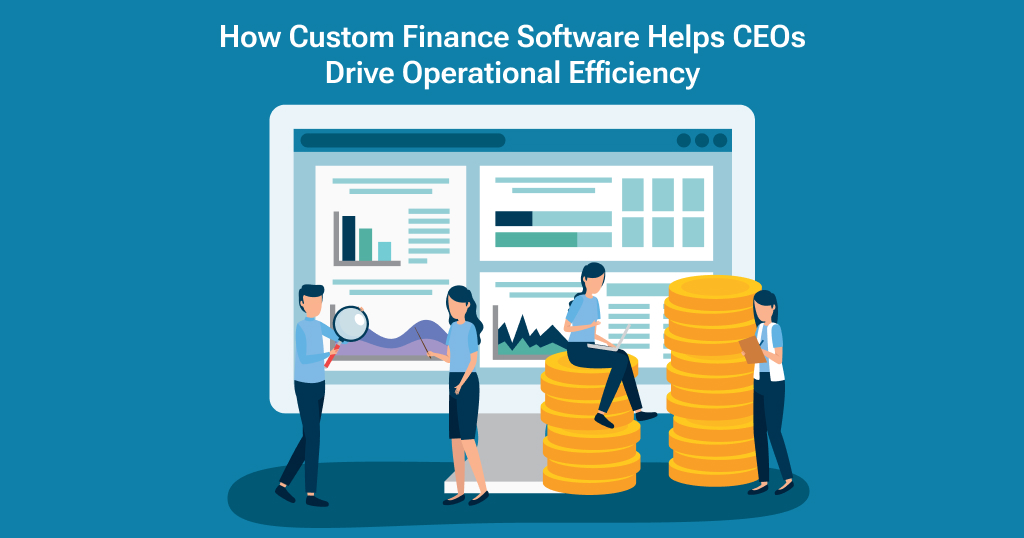How Custom Finance Software Helps CEOs Drive Operational Efficiency
In today’s unpredictable financial landscape, operational efficiency has become a critical necessity rather than a luxury. Fintech CEOs are constantly under pressure to reduce overhead, comply with shifting regulatory frameworks, streamline workflows, and deliver faster, more secure financial services. Amidst all this, custom finance software emerges not just as a solution, but as a strategic asset.
When you partner with a leading software development company in Dubai, they will work closely with your executive and technical teams to build financial management software solutions tailored to your specific business needs—whether it’s automating risk assessments, integrating APIs for faster payments, ensuring compliance with regional and international laws, or leveraging AI to enhance customer service.

Custom finance software gives CEOs full control over processes, data, and innovation—enabling faster decision-making, better reporting accuracy, improved customer experiences, and ultimately, lower operational costs.
This blog explores how best finance software empowers CEOs to drive operational efficiency and agility, and what it costs to develop a tailored financial solution.
What is Custom Finance Software?
Custom finance software is purpose-built to address a company’s specific operational, compliance, analytical, and customer service needs. Unlike generic financial platforms, it’s designed with a fintech firm’s workflows, integrations, and strategic goals in mind.
Examples include:
- Custom accounting platforms
- Loan origination and servicing systems
- Wealth management portals
- AI-based fraud detection engines
- Billing, invoicing, and subscription systems
- Budgeting and financial forecasting tools
7 Ways How Custom Finance Software Improves Operational Efficiency
Explore how custom finance software for operational efficiency transforms financial operations and empowers business leaders to achieve more with less:
1. Automates Repetitive Financial Tasks
From reconciliations to invoicing to financial reporting, automation drastically reduces time-consuming manual tasks. By automating routine operations, you free up internal teams for higher-value work like analytics and strategy. It also reduces payroll dependency, driving long-term cost efficiency.
2. Seamless Integration with Your Fintech Ecosystem
Off-the-shelf tools rarely integrate easily with every API, third-party platform, or legacy infrastructure. Custom financial software solutions interact smoothly with:
- Core banking systems
- Payment gateways
- KYC/AML verification services
- CRM & ERP platforms
Full integration breaks down data silos, streamlines end-to-end workflows, and ensures data accuracy across departments—boosting strategic decision-making.
3. Real-Time Financial Visibility
Custom dashboards deliver real-time insights into key performance indicators (KPIs), account movements, and market trends. Instant visibility into operational metrics empowers you to act fast—whether it’s reallocating budgets, halting risky transactions, or capitalizing on emerging trends.
4. Regulatory Compliance & Audit Readiness
Custom finance software for startups can be developed with region-specific and industry-specific compliance rules in mind (e.g., GDPR, PCI-DSS, SOX, SEC, etc.). It can also generate audit trails automatically. No surprises during audits. You minimize the risk of regulatory penalties while maintaining investor and customer trust.
5. Advanced Security & Fraud Detection
Custom-built platforms let you embed multi-layered security protocols, AI/ML-powered fraud detection, and role-based access control. Enhanced cybersecurity posture protects your company’s most valuable assets—user data, transactions, and reputation. You reduce risk exposure while building user confidence.
6. Scalability Without Operational Bottlenecks
With custom finance software solutions, you can grow your business without sacrificing performance. You can onboard new users, products, or geographic markets without re-architecting your software every time, saving both time and money.
7. Cost Efficiency Over Time
While custom finance software may require a higher initial investment, it eliminates ongoing license fees, minimizes third-party dependencies, and cuts inefficiencies in the long run. More control over costs, better ROI, and ownership of intellectual property.
Custom Finance Software vs Off-the-Shelf: Quick Comparison
| Feature | Custom Software | Off-the-Shelf Software |
| Customization | Full | Limited |
| Integration | Seamless with any tools | Often restrictive |
| Compliance Support | Tailored | Generic |
| Scalability | Designed to scale | May require costly upgrades |
| Cost Over Time | High ROI | Hidden fees, subscriptions |
| Security | Custom protocols | One-size-fits-all security |
Real-World Example of Custom Finance Software: How CEOs Use Custom Software to Scale
Case Study: A Mid-Size Lending Fintech
A lending startup was struggling to manage applications, risk assessment, disbursements, and collections using a combination of spreadsheets and third-party SaaS tools.
Solution They Worked On:
They invested in a custom loan origination system with:
- Automated underwriting
- AI-powered credit scoring
- Payment gateway integration
- Collections dashboard
- Real-time compliance reporting
Result They Achieved:
- Loan approval time reduced by 70%
- Operational costs dropped by 40%
- Employee productivity increased by 35%
- Faster compliance audit turnaround
How Much Does It Cost to Build Custom Finance Software?
There are several factors that influence the cost of custom finance software such as:
- App complexity
- Features
- Third-party integrations
- Development location
- Number of user roles (admin, customer, partner)
- Cloud-based vs. on-premise deployment
- AI/ML, blockchain, or advanced analytics requirements
- Offshore vs. onshore development
*Pro Tip for CEOs: Start with a Minimum Viable Product (MVP) to validate functionality and gradually scale based on real-world performance and feedback.
When Should CEOs Invest in Custom Finance Software?
Before investing in custom finance software, you should ask yourself to follow questions:
- Is our current software limiting growth or efficiency?
- Are we paying for features we don’t use?
- Is compliance becoming more complex?
- Do our teams struggle with data silos?
- Is customer experience compromised?
If you answered yes to two or more, it’s time to consider custom finance software development.
What a Custom Finance Software Development Company Helps in this Project
They specialize in building scalable, secure, and compliance-ready custom finance software for operational efficiency in fintech companies and financial institutions.
Why you should choose a trusted software development company in Dubai for finance software projects:
- 48-hour developer onboarding
- Top 3% of fintech developers
- 7-day risk-free trial
- Expertise in AI, blockchain, cloud, and data analytics
- End-to-end support—from strategy to deployment
Whether you’re building a custom lending platform, a robo-advisory tool, or a personal finance app, they can tailor a solution that aligns with your operational goals and industry regulations.
Final Thoughts
For fintech CEOs aiming to outpace competitors, custom finance software is more than a tech decision—it’s a strategic investment in operational efficiency, scalability, and long-term value. With the right partner and a well-planned development approach, it can transform how your business operates, innovates, and delivers value to customers.





